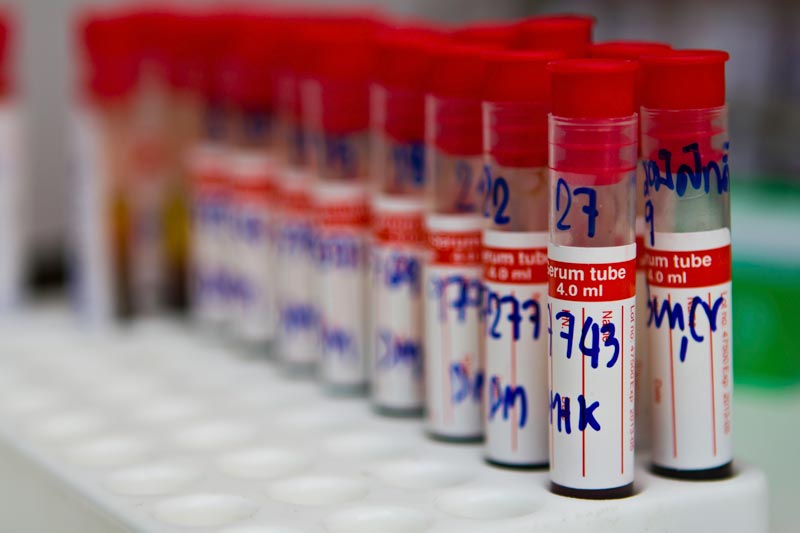
Human health has always been a subject of paramount importance, and as we continue to delve into the intricacies of our bodies, we uncover conditions that require our careful attention. One such condition that demands our understanding is genital warts. These small growths on the genital and anal areas are not only a cause for concern but also a testament to the complexities of human health. Let’s explore the nature of genital warts, their potential implications, and the significance of STD testing in North Haven, CT, in combating their spread.

Genital warts, scientifically known as condylomata acuminata, are a type of sexually transmitted infection (STI) caused by the human papillomavirus (HPV). They manifest as small, flesh-colored, or gray growths on or around the genitals, anus, and in rare cases, the mouth or throat. These warts can appear as single growths or in clusters, and while they might not always cause physical discomfort, they can be a source of emotional distress and can negatively impact one’s self-esteem and sexual well-being.
Benign genital warts exhibit a distinct appearance that aids in their differentiation from potentially malignant growths. They often present as small, flesh-colored, or gray growths that emerge on or around the genital and anal areas. These warts can vary in size and may appear as singular growths or in clusters. Their texture can range from smooth to slightly rough; some might even resemble cauliflower-like bumps. While their presence can be concerning, recognizing these characteristic features and undergoing STD testing in North Haven, CT, are important steps in distinguishing benign genital warts from other skin conditions.
One of the defining characteristics of benign genital warts is their limited spread. Unlike malignant growths, these warts do not exhibit aggressive invasion into surrounding tissues. They tend to remain localized to the initial infection site, making them less likely to migrate to other parts of the body. This contained growth pattern is a key indicator that the warts are not displaying the worrisome behavior associated with malignancy.
Histological examination, which involves studying tissue samples under a microscope, is crucial in determining the nature of genital warts. Benign genital warts show no evidence of cancerous changes in their cellular makeup. Cancer cells are characterized by uncontrolled growth, irregular cell morphology, and invasive behavior in deeper layers of tissue. In the case of benign warts, these hallmarks of cancer are notably absent, providing reassurance that they are not evolving into a malignancy.
The classification of genital warts as benign or malignant is closely linked to the specific strain of HPV responsible for their formation. Benign warts are often associated with low-risk HPV strains, such as HPV-6 and HPV-11. These strains are more inclined to cause the development of warts themselves, rather than progressing to cancer. This distinction underscores the importance of identifying the type of HPV involved in the infection, which can be achieved through comprehensive STD testing in North Haven, CT.
Benign genital warts are generally responsive to medical interventions aimed at their removal and management. Various treatment options, such as topical creams, cryotherapy (freezing), laser therapy, or surgical excision, can effectively eliminate these growths. Once treated, these warts tend to either resolve completely or recur infrequently. The positive response to treatment further supports their benign nature and reinforces the importance of seeking STD testing in North Haven, CT, for proper diagnosis and management.
Genital warts can potentially become malignant when they are caused by high-risk strains of the human papillomavirus (HPV). These high-risk strains, such as HPV-16 and HPV-18, are associated with an increased risk of developing various types of cancer, including cervical, anal, and penile cancer. When genital warts are linked to these high-risk HPV strains, the risk of malignant transformation becomes a concern, highlighting the importance of accurate STD testing in North Haven, CT.
Malignant genital warts often display persistent changes that raise suspicion of malignancy. These changes can include rapid or unusual growth, bleeding, ulceration, or the formation of irregular, raised areas. Any genital warts that exhibit these persistent or worrisome changes should be promptly checked through STD testing in North Haven, CT, to rule out malignancy.
Malignant genital warts exhibit invasive behavior, meaning they can infiltrate and invade nearby tissues. Unlike benign warts that tend to remain localized, malignant warts can extend deeper into surrounding tissues and structures. This invasive behavior is a key indicator of potential malignancy and underscores the importance of accurate STD testing in North Haven, CT.
Histological examination, which involves analyzing tissue samples under a microscope, can reveal cancerous characteristics in genital warts. Malignant warts show cellular abnormalities, such as uncontrolled cell division, altered cell morphology, and the potential to spread to other body areas. These cancerous features on histological examination indicate a heightened risk of malignancy.
Genital warts are primarily caused by HPV, a group of viruses that can infect the genital and anal areas. HPV is highly contagious and is spread through sexual contact, including vaginal, anal, and oral sex. The virus can also be transmitted through close skin-to-skin contact with an infected individual.
Here are the causes of genital warts:
Engaging in sexual activity with a partner who is infected with the human papillomavirus (HPV) is a significant risk factor for contracting the virus and subsequently developing genital warts. HPV is highly contagious and can be transmitted through various forms of sexual contact, including vaginal, anal, and oral intercourse. Importantly, transmission can occur even if visible warts are not present. HPV can be shed from the infected person’s skin or mucous membranes, making it possible to contract the virus without obvious signs of infection. Regular STD testing in North Haven, CT, to detect and manage HPV infections early.
The use of barrier methods, such as condoms or dental dams, during sexual intercourse is a vital strategy to reduce the risk of HPV transmission and the subsequent development of genital warts. Barrier methods provide a physical barrier between partners, minimizing direct skin-to-skin contact and reducing the likelihood of exposure to the virus. Condoms, for instance, can cover the genital and anal areas, common sites for HPV infection. Regular STD testing in North Haven, CT, can provide individuals with the knowledge and resources to protect themselves and their partners.
Close skin-to-skin contact with an individual who has genital warts or is infected with HPV can facilitate the transmission of the virus. Even if condoms are used during sexual intercourse, areas not covered by condoms can still come into contact and allow for viral transmission. Practicing open communication with sexual partners, undergoing regular STD testing in North Haven, CT, and maintaining vigilant sexual health practices are essential in reducing the risk of HPV transmission and subsequent genital warts.
A weakened immune system can significantly increase an individual’s susceptibility to HPV infection and the subsequent development of genital warts. When the immune system is weakened, the body may have difficulty controlling the replication of the HPV virus, leading to more persistent and widespread infections. Regular STD testing is crucial for individuals with weakened immune systems, especially in regions like North Haven, CT, to monitor their sexual health status and take proactive measures to manage and reduce the risk of HPV-related conditions.
Maintaining good genital hygiene is an important aspect of preventing the spread of HPV and the development of genital warts. Poor hygiene practices can create an environment conducive to viral transmission. Keeping the genital area clean and dry helps reduce the risk of infection by minimizing the chance for the virus to thrive on moist skin surfaces. Regular washing and proper care can contribute to maintaining a healthy genital environment and minimizing the risk of HPV transmission.
While benign genital warts may not pose significant health risks, they can still cause discomfort, itching, and irritation. Malignant genital warts, on the other hand, carry the potential to develop into cancerous growths if left untreated. Regular medical check-ups and STD testing in North Haven, CT, are essential to monitor any changes in the appearance or behavior of genital warts.
Here are the complications of untreated genital warts:

Untreated genital warts have the potential to grow larger over time and spread to other areas within the genital and anal regions. They can cause discomfort, irritation, and even pain as they expand. The physical presence of larger warts can also lead to aesthetic concerns, affecting an individual’s body image and overall quality of life. Early intervention with STD testing in North Haven, CT, and appropriate treatment can help prevent the progression of warts and minimize these discomforts.
One of the most serious complications of untreated genital warts is their potential to transform into cancerous growths. Certain strains of HPV, especially high-risk types like HPV-16 and HPV-18, are associated with an elevated risk of developing cervical, anal, and other types of cancers. Regular STD testing and consistent medical check-ups are crucial for closely monitoring any changes in the appearance or behavior of genital warts. Detecting signs of malignant transformation through STD testing in North Haven, CT, early can lead to prompt intervention and potentially life-saving treatments.
Genital warts can pose challenges during pregnancy and childbirth. The presence of warts in the genital area may lead to complications during delivery, necessitating medical procedures such as Cesarean sections. Additionally, the transmission of HPV from mother to newborn can occur during childbirth, potentially resulting in respiratory or genital tract infections in the infant. Regular STD testing in North Haven, CT, and medical care during pregnancy are essential for identifying and managing genital warts to minimize risks to both the mother and the newborn.
Impact The psychological and emotional impact of genital warts should not be underestimated. The stigma surrounding sexually transmitted infections can lead to shame, embarrassment, and anxiety. These emotional burdens can strain relationships, diminish self-esteem, and negatively affect overall well-being. Seeking professional support, practicing open communication, and undergoing regular STD testing in North Haven, CT, testing can help individuals cope with the psychological challenges associated with genital warts and other sexually transmitted infections.
Untreated genital warts increase the risk of transmitting HPV to sexual partners, even if visible warts are not present. This cycle of infection can perpetuate the spread of the virus, leading to potential complications for the affected individual and their partners. Consistent condom use, practicing safe sex, and undergoing regular STD testing in North Haven, CT, are crucial strategies for reducing the risk of transmission and protecting the sexual health of all individuals involved.
Preventing genital warts involves adopting healthy sexual practices and understanding the risks associated with HPV. Key preventive measures include:
One of the most effective ways to prevent genital warts and HPV-related complications is through vaccination. HPV vaccines target the most common high-risk strains of the virus and have been proven to reduce the incidence of HPV infection significantly. These vaccines are recommended for males and females and are typically administered during adolescence. By getting vaccinated early, individuals can build immunity against HPV before they become sexually active, providing long-lasting protection against infection.
Consistently using barrier methods, such as condoms or dental dams, during sexual activity is a crucial strategy to reduce the risk of HPV transmission. While condoms may not provide complete protection due to the potential for skin-to-skin contact in the genital area, they can still significantly lower the risk of infection. Barrier methods create a physical barrier that can help prevent direct contact with the virus and reduce the likelihood of transmission. Practicing safe sex not only helps prevent genital warts but also reduces the risk of other sexually transmitted infections.
Engaging in a mutually monogamous sexual relationship with a partner who is HPV-negative can lower the risk of infection. Limiting the number of sexual partners and ensuring that both individuals have been tested for HPV and other sexually transmitted infections before engaging in sexual activity can help reduce the likelihood of exposure. While monogamy can be an effective preventive measure, it’s important to note that some individuals may have been exposed to HPV before entering the relationship. Regular STD testing and open communication with sexual partners remain crucial, even in monogamous relationships.
Using barrier methods such as condoms or dental dams during sexual activity provides protection against HPV and other sexually transmitted infections. Condoms are readily available and easy to use, offering a practical way to reduce the risk of transmission. While condoms may not cover all potentially infected areas, they can help reduce the likelihood of direct skin-to-skin contact and exposure to the virus.
Regular STD testing in North Haven, CT, including screenings for genital warts and HPV, is a crucial step in maintaining sexual health. Here are the benefits of taking STD testing in North Haven, CT, for genital warts:
STD testing in North Haven, CT, allows for the early detection of genital warts and HPV infections. Detecting these conditions in their early stages enables timely medical intervention and appropriate treatment. Early treatment can prevent the progression of genital warts, reduce the risk of complications, and ensure better health outcomes.
STD testing in North Haven, CT, helps individuals become aware of their infection status, enabling them to take necessary precautions to prevent the transmission of genital warts and HPV to their sexual partners. Knowledge of one’s infection status empowers individuals to practice safe sex, use barrier methods consistently, and engage in responsible sexual behavior, thereby reducing the risk of spreading infections.
Genital warts may sometimes be mistaken for other skin conditions. STD testing in North Haven, CT, provides a reliable means of accurately diagnosing genital warts and distinguishing them from other similar-looking conditions. Accurate STD testing in North Haven, CT, combined with other screening methods, may also determine whether genital warts are benign or malignant.
STD testing in North Haven, CT, offers an opportunity for individuals to receive guidance and education about genital warts, HPV, and other sexually transmitted infections. Healthcare professionals can provide valuable information about preventive measures, safe sexual practices, available treatments, and vaccination options.
Knowing one’s sexual health status can provide peace of mind and reduce anxiety. Regular STD testing in North Haven, CT, allows individuals to take control of their well-being, make informed decisions about their sexual health, and address any concerns promptly. This sense of empowerment contributes to overall mental and emotional well-being.

Understanding genital warts, their nature, and potential risks is essential for maintaining overall well-being. While most genital warts are benign and manageable, the possibility of malignant transformation underscores the importance of proactive healthcare practices. By practicing safe sex, getting vaccinated, and undergoing regular STD testing, individuals can empower themselves to make informed choices and safeguard their sexual health against the complexities of genital warts and HPV.
If you’re seeking prompt and precise STD testing in North Haven, CT, look no further than DOCS Urgent Care & Primary Care – North Haven. Our dedicated team of healthcare professionals is committed to providing fast and accurate STD testing in North Haven, CT, in a confidential and supportive environment. Focusing on your well-being, we offer comprehensive screenings for various sexually transmitted infections, including genital warts and HPV.
Take control of your well-being today! Contact DOCS Urgent Care & Primary Care – North Haven and prioritize your sexual health with confidence.


During this surge in COVID-19 cases, our primary focus is meeting the high demand for tests, and we are seeing higher than usual wait times. This means we are unable to answer most phone calls. Please know that our teams are working very hard during this time to care for as many patients as safely as possible. Please click the button below for answers to common questions. We appreciate your understanding.